Mood-o-meter, 0/0 yin-yang, books with friends: Newsletter December 2
Got this from a friend? Reading online? Subscribe! I am Moby Snoodles, and this is my newsletter. Send me your requests, questions and comments at moby@moebiusnoodles.com 
Questions and answers
Help @remypoon at the Ask and Tell hub with this new question:
How can we help young students to know learning mathematics is more than just getting the answer? Click to reply.
Sheryl Morris emailed Moby:
Manipulatives don’t always help – they sometimes impede learning. How do you feel about manipulatives?
Moby:
Here are some examples of known issues with manipulatives.
- Kids are driven to distraction and totally free play, away from any math whatsoever.
- The manipulative only represents one aspect of an abstract idea, but kids are forever stuck with that aspect, because the manipulative is so memorable (e.g. multiplication as repeated addition).
- Kids don’t know where the analogy in the manipulative breaks down (e.g. that points aren’t really tiny dots). No manipulative can capture a math idea completely and absolutely right.
- Often manipulatives aren’t sustainable. They take a lot of time to make, or a lot of money to buy – while a kid only spends a few minutes using them.
I feel that the best use of manipulatives is for students to MAKE them!
Bright, Brave, Open Minds: an online course starts December 2
More than 70 participants registered for the open online course on problem-solving by Julia Brodsky. The goals of the course are to help parents and teachers preserve children’s divergent thinking, and to develop critical thinking and problem solving skills. The course is the last round of crowd-sourced feedback for the Creative Commons book Julia is writing. 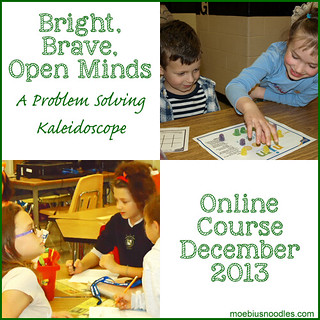
Blogs and networks
Try an easy math craft: two paper gears that make mood-o-meter smileys, from our Facebook friends at New Gottland. The table on the right is like a multiplication table… of moods! 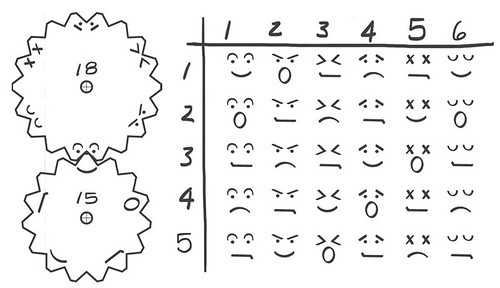 When you need lapware (software for the kid is on your lap), try the PhotoSpiralysis nested fractal maker with your kids. My young guests and I had a lot of fun with it this Thanksgiving.
When you need lapware (software for the kid is on your lap), try the PhotoSpiralysis nested fractal maker with your kids. My young guests and I had a lot of fun with it this Thanksgiving. 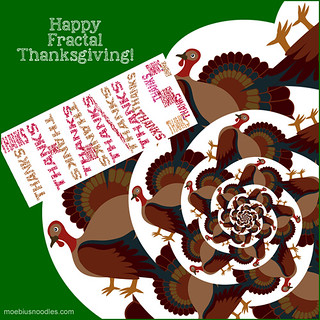 Michel Paul discovered the zen of dividing zero by zero when he circled an expression on the blackboard. Loren Renee commented: “It’s a “pair of ducks” as my son used to say.”
Michel Paul discovered the zen of dividing zero by zero when he circled an expression on the blackboard. Loren Renee commented: “It’s a “pair of ducks” as my son used to say.” 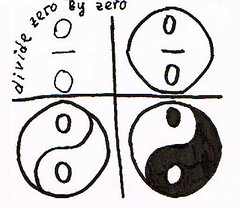 Yelena McManaman’s blog post “Fluency or complexity” sparked a discussion at our Facebook page.
Yelena McManaman’s blog post “Fluency or complexity” sparked a discussion at our Facebook page. 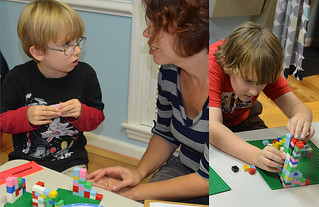
- Yelena: I am very proud of my 6-year old and the math discoveries he makes. Two days ago he came up with a proof that zero is an even number. Yesterday he built something he called “a square that has volume” (a cube), then connected 4 of them into a larger cube. And today, well before I had time to drink my morning tea, he shared his new discovery – turns out, Russian nesting dolls are fractal! I am very concerned about my 6-year old’s struggles with math. He still gets mixed up counting past 10. He is shaky with his math facts. He still needs to use fingers, counting bears or abacus a lot.
- Jeremy Vyska: I imagine it’s much the same way kids can do complex things like riding bicycles, climbing various playground equipment, etc; then have issues of tripping while walking. Practice will make the simpler things resolve/repair over time.
- Malke Rosenfeld: Most of the children I work with (upper elementary) do not yet have the skills they need to learn and perform complex percussive dance steps. I still wanted to give them a sense of what it feels like to dance in my art form, and also to create their own dance steps. How to do this without a lot of technique? I created Jump Patterns which allow children to think, create and communicate within the discipline. Their technical skills are developed on a parallel track.
- Kyle Griffin: Many of us who love chatting with our young children about the ideas of calculus and relativity and such still recognize an enormous gap between “ideas” and ability to do. I personally find that most of the time, one eventually hits a point with the ideas where the inability to do the thing results in an impenetrable barrier. That’s not to say that the idea-set isn’t fun, useful, interesting, and motivational. But it’s also nearly 100% independent of what other folks will care about in a child’s education. “I don’t care if you know the theory of good writing. Can you write well?”
- Peter Appelbaum: The misnomer that counting and arimethmetic is somehow fundamental to other kinds of mathematics really does lead to so many missed opportunities. Think if all of the successful mathematicians who are calculation-phobic. Of course, this is how ideology works. It masquerades as “reality.”
Book news: sharing with friends and math circles
Several people asked for easy ways to order Moebius Noodles: Adventurous Math for the Playground Crowd for a group of friends or a buyer coop. Now you get discounts if you order with a friend or three (2-4 copies), with your math circle (5-10 copies), or with a larger learning coop. You also save a lot on shipping. Happy holidays! 
Sharing
You are welcome to share the contents of this newsletter online or in print. You can also remix and tweak anything as you wish, as long as you share your creations on the same terms. Please credit MoebiusNoodles.com More formally, we distribute all Moebius Noodles content under the Creative Commons Attribution-NonCommercial-ShareAlike license: CC BY-NC-SA ![]() Talk to you again on December 15th! Moby Snoodles, aka Dr. Maria Droujkova
Talk to you again on December 15th! Moby Snoodles, aka Dr. Maria Droujkova
Related Posts
Posted in Newsletter







Leave a Reply